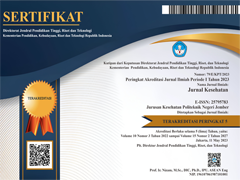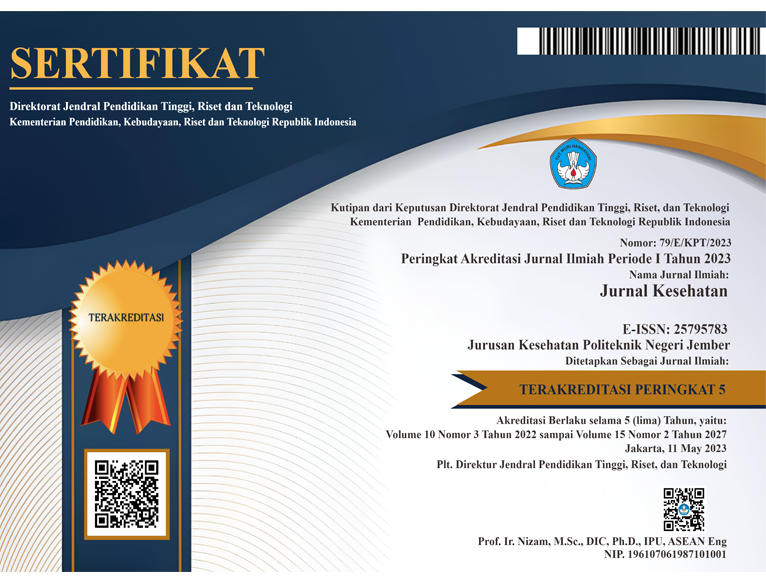Pola Asuh Ibu dalam Kebersihan Organ Reproduksi selama Menstruasi pada Remaja Tunagrahita
DOI:
10.25047/j-kes.v8i3.193Downloads
Abstract
Mentally retarded children are children who have limitations in intellectual abilities. The classification of mental retardation based on intellectual classification is divided into three classes, namely debil/moron, moderate, and idiot. Mentally retarded children will step into adolescence which will be marked by physical changes but not in line with their thinking abilities. Reproductive health problems arise in children with mental retardation, especially during menstruation. Personal hygiene during menstruation should be noticed by mentally disabled children that have mental retardation. The role of mothers in caring is very helpful in personal hygiene during menstruation so that children with mental disabilities can be more independent and do not depend on others. The purpose of this study is to explore the mother education system toward personal hygiene of reproductive organs during menstruation in mentally retarded adolescents. The determination of informants in this study by using purposive technique. Researchers collected data using in-depth interviews, and triangulation of sources. The results of this study indicate that all informants provided regulatory aspects through communicated oral regulations such as by reminding and giving examples. Most mothers have given punishment through verbal, such as yelling, and through physical punishment such as hitting. All mothers have given appreciation through praise in subtle ways, smiles, seduction when the child can behave following what has been taught. All mothers have provided an aspect of consistency by reminding their children all the time, communicating with the school’s teacher, additionally providing examples and direct practice in front of the children.Keywords:
Personal hygiene, menstruation, mother education system, disabled childrenReferences
Abrori, A dan Ermulyadi. (2017). Faktor yang Berhubungan dengan Kejadian Keputihan Patologis Siswi SMAN 1 Simpang Hilir Kabupaten Kayong Utara. Unnes Journal of Public Health, 6 (1)., 24–34.https://doi.org/https://doi.org/10.15294/ujph.v6i1.14107
Andira, D. (2010). Seluk Beluk Kesehatan Reproduksi Wanita. Jogjakarta: A Plus Books.
Astuti, Dewi, Widiastuti, Hndayani. (2016). Hubungan Tingkat Pengetahuan Remaja Putri Dengan Perilaku Personal Hygiene Organ Reproduksi Di SMP Negeri 3 Kendal. Jurnal Ilmu Keperawatan Dan Kebidanan, 7(1), 34–37.
Azis, S. (2015). Pendidikan Anak Berkebutuhan Khusus. Yogyakarta: Gava Media.
Badan Pusat Statistik Provinsi Jawa Timur. (2019). Data Prosentase Banyaknya Desa Kelurahan menurut Keberadaan Penyandang Cacat. Surabaya: Badan Pusat Statistik Provinsi Jawa Timur.
Dariani, E. (2016). Dukungan Sosial Orang Tua dalam Membentuk Perilaku Personal Hygiene Anak Tunagrahita yang Sudah Mengalami Menstruasi (Studi Kualitatif di SLB-C TPA Jember). Skripsi. Jember: Universitas Jember.
Dinas Kesehatan Kabupaten Jember. (2016). Profil Dinas Kesehatan Kabupaten Jember. Jember: Dinas Kesehatan Kabupaten Jember.
Dinas Sosial Kabupaten Jember. (2016). Profil Dinas Sosial Kabupaten Jember. Jember: Dinas Sosial Kabupaten Jember.
Heriyanto. (2018). Thematic Analysis sebagai Metode Menganalisa Data untuk Penelitian Kualitatif. Jurnal Anuva (Jurnal Kajian Budaya, Perpustakaan, dan Informasi), 2(3).317–324. https://doi.org/10.14710/anuva.2.3.317-324
Hurlock, (2010). Psikologi Perkembangan: Suatu Pendekatan Sepanjang Rentang Kehidupan. Jakarta: Erlangga.
Ismandari, F. (2019). Situasi Disabilitas. Jakarta: Pusat Data Dan Informasi Kementerian Kesehatan Republik Indonesia.
Kementerian Hukum dan Hak Asasi Manusia Republik Indonesia. (2016). UU 8 Tahun 2016 tentang Penyandang Disabilitas. Jakarta: Kementerian Hukum dan Hak Asasi Manusia Republik Indonesia.
Kusmiran. (2011). Kesehatan Reproduksi Remaja dan Wanita. Jakarta: Salemba Medika.
Rochyadi. (2012). Karakteristik dan Pendidikan Anak Tunagrahita. Modul Universitas Pendidikan Indonesia. Retrieved 13 November 2019, from http://file.upi.edu/Direktori/FIP/JUR._PEND._LUAR_BIASA/195608181985031-ENDANG_ROCHYADI/MODUL/PGSD4409-M6-LPK.pdf website: file.upi.edu
Soemantri. (2012). Psikologi Anak Luar Biasa. Bandung: PT Refika Aditama.
License
Authors who publish in this journal agree to the following terms:
1. Copyright belongs to the medical journal as a publication
2. The author retains copyright and grants the journal rights to the first publication carried out simultaneously under a Creative Commons Attribution License which allows others to share the work with an acknowledgment of the author's work and initial publication in this journal.
3. Authors may enter into separate additional contractual arrangements for the non-exclusive distribution of the work (eg sending it to an institutional repository or publishing it in a book) with acknowledgment of initial publication in this journal.
4. Authors are permitted and encouraged to post work online (eg in institutional repositories or on their websites) before and during the submission process, as before and larger citations of published work (see Effects of Open Access).
Selengkapnya tentang teks sumber ini














